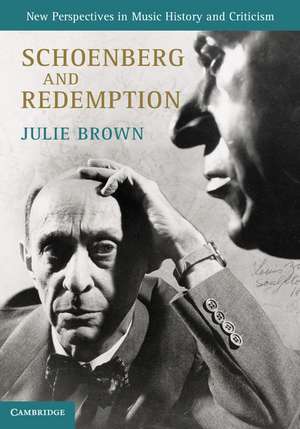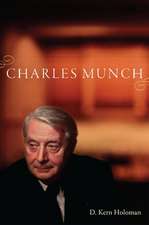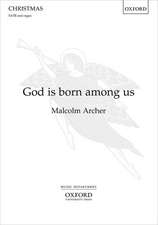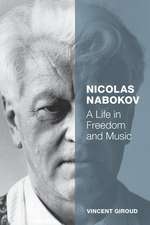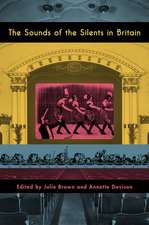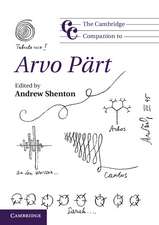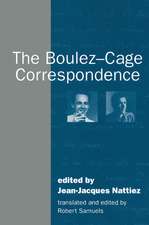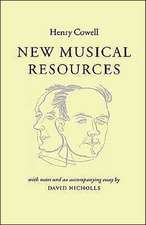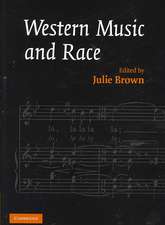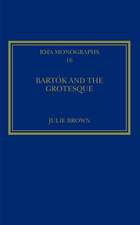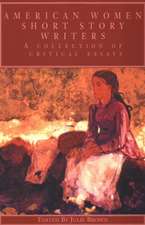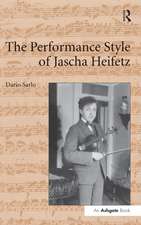Schoenberg and Redemption: New Perspectives in Music History and Criticism
Autor Julie Brownen Limba Engleză Hardback – 25 iun 2014
| Toate formatele și edițiile | Preț | Express |
|---|---|---|
| Paperback (1) | 289.57 lei 6-8 săpt. | |
| Cambridge University Press – 19 dec 2018 | 289.57 lei 6-8 săpt. | |
| Hardback (1) | 701.06 lei 6-8 săpt. | |
| Cambridge University Press – 25 iun 2014 | 701.06 lei 6-8 săpt. |
Din seria New Perspectives in Music History and Criticism
-
 Preț: 259.93 lei
Preț: 259.93 lei -
 Preț: 289.57 lei
Preț: 289.57 lei -
 Preț: 290.54 lei
Preț: 290.54 lei -
 Preț: 288.42 lei
Preț: 288.42 lei -
 Preț: 437.60 lei
Preț: 437.60 lei -
 Preț: 329.83 lei
Preț: 329.83 lei -
 Preț: 295.80 lei
Preț: 295.80 lei -
 Preț: 390.42 lei
Preț: 390.42 lei -
 Preț: 299.82 lei
Preț: 299.82 lei -
 Preț: 321.81 lei
Preț: 321.81 lei -
 Preț: 297.53 lei
Preț: 297.53 lei -
 Preț: 318.64 lei
Preț: 318.64 lei -
 Preț: 287.48 lei
Preț: 287.48 lei -
 Preț: 364.64 lei
Preț: 364.64 lei -
 Preț: 364.26 lei
Preț: 364.26 lei -
 Preț: 369.69 lei
Preț: 369.69 lei -
 Preț: 298.56 lei
Preț: 298.56 lei -
 Preț: 285.93 lei
Preț: 285.93 lei -
 Preț: 304.23 lei
Preț: 304.23 lei -
 Preț: 325.77 lei
Preț: 325.77 lei -
 Preț: 325.38 lei
Preț: 325.38 lei -
 Preț: 451.36 lei
Preț: 451.36 lei -
 Preț: 178.34 lei
Preț: 178.34 lei -
 Preț: 202.36 lei
Preț: 202.36 lei -
 Preț: 436.28 lei
Preț: 436.28 lei - 11%
 Preț: 700.05 lei
Preț: 700.05 lei
Preț: 701.06 lei
Preț vechi: 787.71 lei
-11% Nou
Puncte Express: 1052
Preț estimativ în valută:
134.14€ • 140.44$ • 110.100£
134.14€ • 140.44$ • 110.100£
Carte tipărită la comandă
Livrare economică 05-19 aprilie
Preluare comenzi: 021 569.72.76
Specificații
ISBN-13: 9780521550352
ISBN-10: 0521550351
Pagini: 274
Ilustrații: 2 b/w illus. 3 music examples
Dimensiuni: 180 x 262 x 18 mm
Greutate: 0.7 kg
Ediția:New.
Editura: Cambridge University Press
Colecția Cambridge University Press
Seria New Perspectives in Music History and Criticism
Locul publicării:Cambridge, United Kingdom
ISBN-10: 0521550351
Pagini: 274
Ilustrații: 2 b/w illus. 3 music examples
Dimensiuni: 180 x 262 x 18 mm
Greutate: 0.7 kg
Ediția:New.
Editura: Cambridge University Press
Colecția Cambridge University Press
Seria New Perspectives in Music History and Criticism
Locul publicării:Cambridge, United Kingdom
Cuprins
Introduction; 1. Schoenberg, history, trauma?; 2. Schoenberg as Christ; 3. Otto Weininger, Richard Wagner and musical discourse in turn-of-the-century Vienna; 4. Schoenberg and Wagnerian Deutschtum; 5. Compositional innovation and the redemption of Ahasuerus; 6. Woman and the symbolism of self-redemption; 7. Re-reading Schoenberg's Musical Idea; 8. Coda: changing history into memory; Appendix. 'Every young Jew'.
Recenzii
'This book reopens the subject of Jewish culture in the life and work of the twentieth-century classical composer Arnold Schoenberg … [it] draws on the writings of Austrian philosopher Otto Weininger, providing a welcome reintroduction of his work into musicological research. Above all, the author shows a remarkable ability to negotiate the shifting sands of Schoenberg's thought in an authoritative manner, not an easy task … this stimulating book should be available to all who are interested in European culture …' M. Dineen, Choice
'… Schoenberg and Redemption offers important evidence with highly believable postulations … this is an important book that deserves a wide readership …' Michael Haas, Times Literary Supplement
'Julie Brown's Schoenberg and Redemption newly testifies to the power of a composer's self-expressive prose … Bringing to light two previously [understudied] writings of Schoenberg, Julie Brown presents an absorbing view of his turn to atonality … Brown records a history of Schoenberg's modernist invention, and in the process, adds to Wagner's legacy too.' Victoria Aschheim, Notes: Quarterly Journal of the Music Library Association
'… Schoenberg and Redemption offers important evidence with highly believable postulations … this is an important book that deserves a wide readership …' Michael Haas, Times Literary Supplement
'Julie Brown's Schoenberg and Redemption newly testifies to the power of a composer's self-expressive prose … Bringing to light two previously [understudied] writings of Schoenberg, Julie Brown presents an absorbing view of his turn to atonality … Brown records a history of Schoenberg's modernist invention, and in the process, adds to Wagner's legacy too.' Victoria Aschheim, Notes: Quarterly Journal of the Music Library Association
Descriere
Julie Brown reconsiders Schoenberg's step into atonality as a response to Wagner's charges concerning the Jewish influence on German music.
